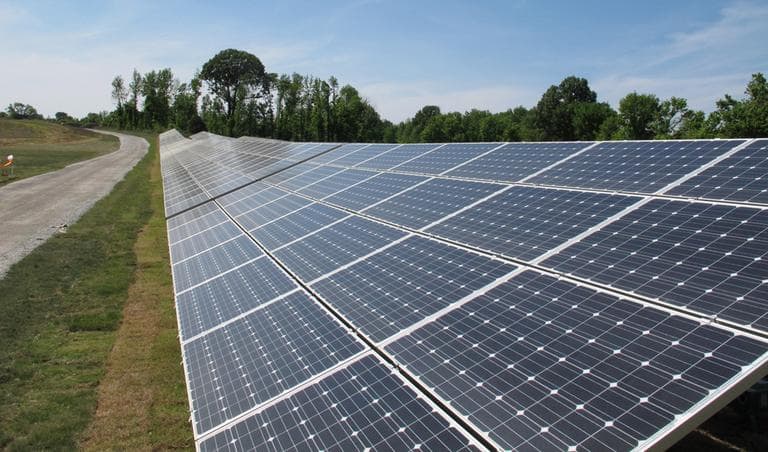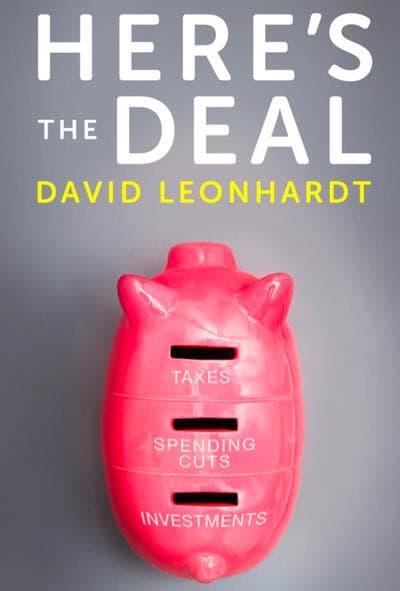Advertisement
A Call For A Greener State Of The Union
Resume
Strong language on climate change and a renewed push for green energy will be part of the ambitious agenda President Barack Obama is expected to outline this evening in his State of the Union address.
But as the headline of an opinion piece by David Leonhardt in the Sunday New York Times reminds us, "It’s Not Easy Being Green."
Beyond the strong Republican opposition to any broad legislation on climate change, Democrats did not manage to pass their key measure on cutting carbon emissions, cap-and-trade, even when they controlled both Houses of Congress.
Leonhardt, the Times' Washington bureau chief, says Democrats have failed to pass green energy laws because they have been making a poor argument - that going green will create jobs.
Green energy, he says, is simply more expensive for households and business, and to convince the country to adopt it requires a different argument: Climate change is turning out to be even more expensive.
Once that argument has been made, Leonhardt says the parties will find there is a lot of common ground on the most efficient ways of cutting global warming emissions.
Leonhardt published an e-book last week called, "Here's the Deal," about how Washington can solve the deficit and spur growth. An excerpt of which appears below.
____Book Excerpt: 'Here's the Deal'
By: David Leonhardt____
 All of the manufactured budget crises of the past few years—the fiscal cliff, the debt ceiling, sequestration—have made it easy to think of our deficit problems as merely a case of partisan politics. Many people are left to wonder why Democrats and Republicans can’t simply be sensible, make some compromises and stop the silliness. And there certainly has been silliness.
All of the manufactured budget crises of the past few years—the fiscal cliff, the debt ceiling, sequestration—have made it easy to think of our deficit problems as merely a case of partisan politics. Many people are left to wonder why Democrats and Republicans can’t simply be sensible, make some compromises and stop the silliness. And there certainly has been silliness.Yet the very real fiscal problem facing the country is not silly, manufactured or simple partisanship. The problem is us—the voters. We have not managed to figure out what kind of government, and what kind of economy, we want. The seemingly irrational politicians in Washington are, to some extent, responding rationally to their own confused constituents.
For a long time, we didn’t have to make tough choices. Our population was fairly young, and much of the rest of the world was hobbled by war damage, poverty or Soviet-style control, if not all three. Strong economic growth in the United States filled Washington’s coffers with tax revenue, while the small number of elderly held down the costs of Social Security and Medicare. The relatively basic state of medicine helped, too, restraining health-care costs. Thanks to all those friendly forces, the country could afford to cut tax rates while expanding government benefits.
The two political parties adopted their modern forms in response. Starting in the 1970s, especially in California, Republicans built their party around the idea of lower taxes. The past three Republican presidents and both of the Republican House majorities of the past 20 years have based their campaigns to a large degree on tax cuts. Many Republicans have signed a pledge, written by conservative activist Grover Norquist, promising never to raise taxes, under any circumstances. No wonder, then, that total tax rates—combined federal, state and local—have fallen for the vast majority of Americans up and down the income spectrum over the past three decades.
Democrats, for their part, have continued a legacy begun by President Franklin D. Roosevelt—protecting and expanding the safety net—while also responding to voters’ desire for low taxes. The party has campaigned successfully on protecting Medicare and Social Security and added new benefits as well: financial aid for college, funding for preschool, money for scientific research and, most significant, a vast expansion of health insurance. Yet Presidents Bill Clinton and Barack Obama also cut taxes for the majority of Americans (while raising them on the affluent).
In the simplest terms, Republicans have won the debate on taxes, and Democrats have won the debate on benefits. We, the voters, have chosen the winner of each. In exchange, we have a federal government facing enormous deficits in coming decades. As Barry Goldwater asked, “Where is the politician who has not promised his constituents a fight to the death for lower taxes—and who has not proceeded to vote for the very spending projects that make tax cuts impossible?”
As a result, annual deficits—after shrinking over the next several years as the economy continues recovering from the financial crisis—are projected to spiral. In 25 years, the Congressional Budget Office predicts, it will equal 17 percent of gross domestic product, far more than even during World War II. Needless to say, any economic forecast that tries to look a quarter-century into the future comes with a heavy dose of uncertainty. Lately, some Democrats have begun to argue that the combination of this uncertainty and the projected progress over the next few years is reason to stop worrying about the deficit. Obama barely mentioned it in his second inaugural address.
But the odds that the deficit will solve itself remain small. The expected near-term progress depends in part on savings that are unlikely ever to materialize, such as the scheduled expiration of popular tax credits. Even if the deficit does decline at a steady pace, the federal debt—the accumulation of prior deficit—remains worrisomely high. And it will begin growing again soon as more baby boomers retire.
There are, of course, important nuances to the story. The deficit is not an immediate crisis—at least not unless Washington makes it one by voluntarily defaulting on the country’s debt payments. Foreign banks remain willing to lend the United States money at extraordinarily low interest rates, an expression of confidence in this country’s economic future, especially relative to the rest of the world. The bigger immediate problem appears to be unemployment and weak income growth, both of which could probably be helped by a larger short-term deficit, to pay for new construction projections, extended jobless benefits and the like.
It would also be a mistake to claim—for the sake of partisan symmetry, a more comfortable place for many of us to be—that the two parties are equally to blame. Sometimes, one party has a record that is harder to defend than the other. Depending on the issue, the party changes. All three Republican presidents over the past 30 years have created large deficits. Under Bill Clinton, by contrast, the deficit disappeared, thanks to a combination of strong growth, tax increases on high incomes (unanimously opposed by Congressional Republicans) and spending restraint (pushed by Congressional Republicans).
Obama’s fiscal record remains incomplete. But the simple truth is that today’s Democrats have gone on record as accepting a much longer list of specific deficit-reduction measures than Republicans. These include higher tax rates; restrictions on tax loopholes; cuts in Medicare payments to hospitals and insurers; restrictions on treatments that lack scientific evidence, caricatured as “death panels”; modest changes to Social Security; and military cuts. Some of those measures have contributed to the recent decline of the deficit and to the continued projected decline over the next decade, according to the nonpartisan Congressional Budget Office.
Still, Democrats should not be smug about their fiscal record. It grades well only on a curve. Most Democrats have not leveled with voters about the coming need to choose between tax increases—not just on the rich—and spending cuts. And most voters, of both parties and of neither, have not leveled with themselves, either.
Excerpted from the New York Times/ Byliner Original e-book HERE'S THE DEAL by David Leonhardt. Copyright © 2013 by David Leonhardt. Reprinted with permission of Byliner, Inc.
Guest:
- David Leonhardt, Washington Bureau Chief for The New York Times. His new e-book is "Here's The Deal."
This segment aired on February 12, 2013.